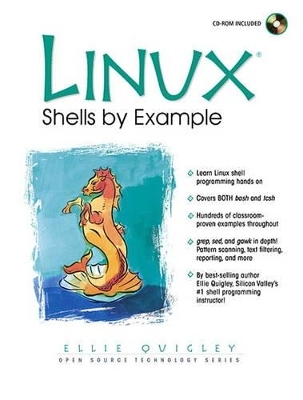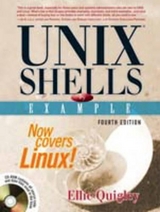
Linux Shells by Example
Prentice Hall
978-0-13-014711-0 (ISBN)
- Titel erscheint in neuer Auflage
- Artikel merken
Full of classroom-proven examples from Silicon Valley's top shell programming instructor, Linux Shells by Example starts with the basics and carries you all the way to expert-level techniques. Start by discovering what Linux shells are, what they do, and how they integrate with other LINUX utilities and processes. Next, master creating, running, and debugging shell scripts; using grep, sed, and gawk, and much more. This edition contains especially detailed and valuable coverage of Gawk, including pattern scanning, text filtering, reporting, and many other key applications. You'll review the Bourne Again (bash) and TC (tcsh) shells in depth, discovering how they compare, and when to use each. The book contains hands-on exercises for every topic, an appendix with detailed syntax listings, examples of many useful Linux utilities, comparison charts, and all the book's code on CD-ROM -- an awesome resource. For everyone who wants to learn shell programming with Linux, including system administrators, application developers, Web professionals, and power users.
ELLIE QUIGLEY is author of Perl by Example and UNIX Shells by Example and creator of the world's #1 interactive Perl course, Perl Multimedia Cyber Classroom. A leading instructor and trainer, her courses in Perl and UNIX shell programming at the University of California Santa Cruz Extension Program and at Sun Microsystems have become legendary throughout Silicon Valley.
1. Introduction to Linux Shells.
Why Linux? Definition and Function of a Shell. System Startup and the Login Shell. Processes and the Shell. The Environment and Inheritance. Executing Commands from Scripts.
2. The Linux Tool Box.
Regular Expressions. Combining Regular Expression Metacharacters.
3. The grep Family (Gnu & Sons).
The grep Command. Extended grep (grep -E or egrep). Fixed grep (grep -F and fgrep). Recursive grep (rgrep). grep with Pipes. grep with Options. Linux Tools Lab.
4. The Streamlined Editor.
What Is sed? Versions of sed. How Does sed Work? Addressing. Commands and Options. Error Messages and Exit Status. sed Examples. sed Scripting. Linux Tools Lab.
5. The gawk Utility: gawk as a Linux Tool.
What's awk? What's nawk? What's gawk? awk's Format. Formatting Output. awk Commands from within a File. Records and Fields. Patterns and Actions. Regular Expressions. awk Commands in a Script File. Review. Linux Tools Lab.
6. The gawk Utility: Evaluating Expressions.
Comparison Expressions. Review. Linux Tools Lab.
7. The gawk Utility: gawk Programming.
Variables. Redirection and Pipes. Pipes. Closing Files and Pipes. Review. Linux Tools Lab. Conditional Statements. Loops. Program Control Statements. Arrays. awk Built-In Functions. User-Defined Functions. Review. Linux Tools Lab. Odds and Ends. Review. Linux Tools Lab.
8. The Interactive Bash Shell.
Introduction. Command Line Shortcuts. Variables. The Bourne Shell Lab Exercises.
9. Programming with the Bash Shell.
Introduction. Reading User Input. Arithmetic. Positional Parameters and Command Line Arguments. Conditional Constructs and Flow Control. Looping Commands. Functions. Trapping Signals. Debugging. Processing Command Line Options with getopts. The eval Command and Parsing the Command Line. Bash Options. Shell Built-In Commands. The Bash Shell Lab Exercises.
10. The Interactive TC Shell.
Introduction. The TC Shell Environment. Command Line Shortcuts. Job Control. Metacharacters. Redirection and Pipes. Variables. Arrays. Special Variables and Modifiers. Command Substitution. Quoting. Built-In Commands. The TC Shell Lab Exercises.
11. Programming with the TC Shell.
Steps in Creating a Shell Script. Reading User Input. Arithmetic. Debugging Scripts. Command Line Arguments. Flow Control and Conditional Constructs. Loops. Interrupt Handling. setuid Scripts. Storing Scripts. Built-In Commands. The TC Shell Lab Exercises.
Appendix A: Useful Linux/UNIX Utilities for Shell Programmers.
Appendix B: Comparison of the Shells.
tcsh versus csh. bash versus sh.
Appendix C: Steps for Using Quoting Correctly.
Index.
| Erscheint lt. Verlag | 8.6.2000 |
|---|---|
| Verlagsort | Upper Saddle River |
| Sprache | englisch |
| Gewicht | 1482 g |
| Themenwelt | Informatik ► Betriebssysteme / Server ► Unix / Linux |
| ISBN-10 | 0-13-014711-7 / 0130147117 |
| ISBN-13 | 978-0-13-014711-0 / 9780130147110 |
| Zustand | Neuware |
| Informationen gemäß Produktsicherheitsverordnung (GPSR) | |
| Haben Sie eine Frage zum Produkt? |
